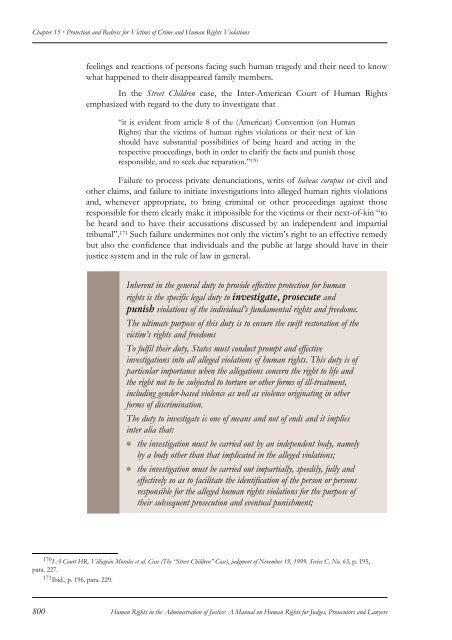protection and redress for victims of crime and human rights violations
protection and redress for victims of crime and human rights violations
protection and redress for victims of crime and human rights violations
Create successful ePaper yourself
Turn your PDF publications into a flip-book with our unique Google optimized e-Paper software.
Chapter 15 • Protection <strong>and</strong> Redress <strong>for</strong> Victims <strong>of</strong> Crime <strong>and</strong> Human Rights Violationsfeelings <strong>and</strong> reactions <strong>of</strong> persons facing such <strong>human</strong> tragedy <strong>and</strong> their need to knowwhat happened to their disappeared family members.In the Street Children case, the Inter-American Court <strong>of</strong> Human Rightsemphasized with regard to the duty to investigate that“it is evident from article 8 <strong>of</strong> the (American) Convention (on HumanRights) that the <strong>victims</strong> <strong>of</strong> <strong>human</strong> <strong>rights</strong> <strong>violations</strong> or their next <strong>of</strong> kinshould have substantial possibilities <strong>of</strong> being heard <strong>and</strong> acting in therespective proceedings, both in order to clarify the facts <strong>and</strong> punish thoseresponsible, <strong>and</strong> to seek due reparation.” 170Failure to process private denunciations, writs <strong>of</strong> habeas corupus or civil <strong>and</strong>other claims, <strong>and</strong> failure to initiate investigations into alleged <strong>human</strong> <strong>rights</strong> <strong>violations</strong><strong>and</strong>, whenever appropriate, to bring criminal or other proceedings against thoseresponsible <strong>for</strong> them clearly make it impossible <strong>for</strong> the <strong>victims</strong> or their next-<strong>of</strong>-kin “tobe heard <strong>and</strong> to have their accusations discussed by an independent <strong>and</strong> impartialtribunal”. 171 Such failure undermines not only the victim’s right to an effective remedybut also the confidence that individuals <strong>and</strong> the public at large should have in theirjustice system <strong>and</strong> in the rule <strong>of</strong> law in general.Inherent in the general duty to provide effective <strong>protection</strong> <strong>for</strong> <strong>human</strong><strong>rights</strong> is the specific legal duty to investigate, prosecute <strong>and</strong>punish <strong>violations</strong> <strong>of</strong> the individual’s fundamental <strong>rights</strong> <strong>and</strong> freedoms.The ultimate purpose <strong>of</strong> this duty is to ensure the swift restoration <strong>of</strong> thevictim’s <strong>rights</strong> <strong>and</strong> freedomsTo fulfil their duty, States must conduct prompt <strong>and</strong> effectiveinvestigations into all alleged <strong>violations</strong> <strong>of</strong> <strong>human</strong> <strong>rights</strong>. This duty is <strong>of</strong>particular importance when the allegations concern the right to life <strong>and</strong>the right not to be subjected to torture or other <strong>for</strong>ms <strong>of</strong> ill-treatment,including gender-based violence as well as violence originating in other<strong>for</strong>ms <strong>of</strong> discrimination.The duty to investigate is one <strong>of</strong> means <strong>and</strong> not <strong>of</strong> ends <strong>and</strong> it impliesinter alia that: the investigation must be carried out by an independent body, namelyby a body other than that implicated in the alleged <strong>violations</strong>; the investigation must be carried out impartially, speedily, fully <strong>and</strong>effectively so as to facilitate the identification <strong>of</strong> the person or personsresponsible <strong>for</strong> the alleged <strong>human</strong> <strong>rights</strong> <strong>violations</strong> <strong>for</strong> the purpose <strong>of</strong>their subsequent prosecution <strong>and</strong> eventual punishment;170 I-A Court HR, Villagrán Morales et al. Case (The “Street Children” Case), judgment <strong>of</strong> November 19, 1999, Series C, No. 63, p. 195,para. 227.171 Ibid., p. 196, para. 229.800 Human Rights in the Administration <strong>of</strong> Justice: A Manual on Human Rights <strong>for</strong> Judges, Prosecutors <strong>and</strong> Lawyers
















